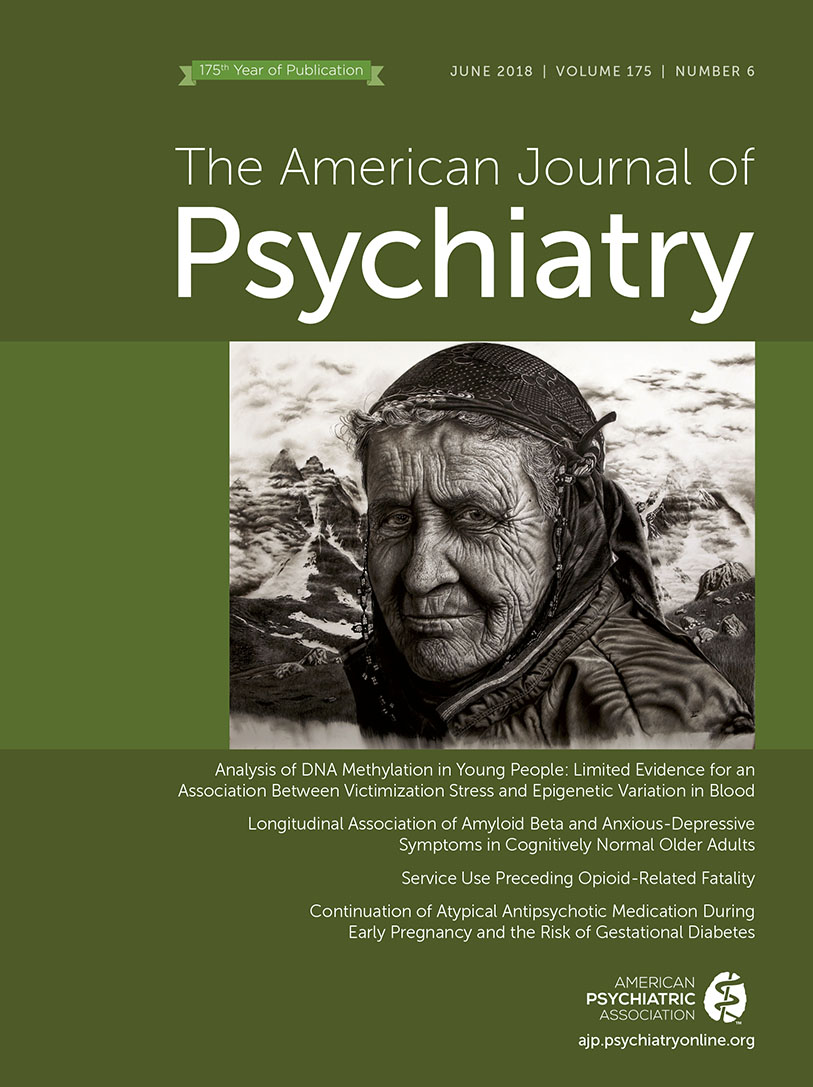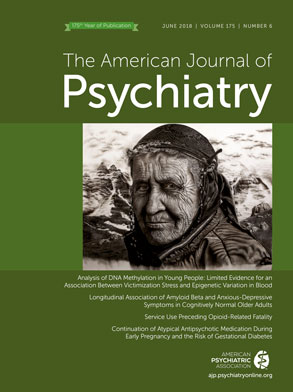As the only country with a rising maternal mortality rate in the industrialized world (
1), the United States has recently been in the public health spotlight. According to the Centers for Disease Control and Prevention, >60% of maternal deaths are preventable, attributable primarily to failures in diagnosis or treatment. Included among the list of preventable causes of death are those associated with mental illness. Individuals with mental illness also commonly die prematurely from preventable health conditions, with cardiovascular disease mortality being the most commonly observed cause of death. This is due in part to the increased prevalence and severity of risk factors for cardiovascular disease in this population, including obesity, smoking, dyslipidemia, hypertension, and diabetes. Furthermore, there is now considerable evidence of reduced rates of screening for diabetes and cardiovascular disease risk factors in mentally ill populations (
2), as well as reduced screening for cancer risk factors, especially among women (e.g., cervical cancer screening) (
3). Therefore, women with mental illness represent a uniquely vulnerable population, particularly with respect to reproductive medicine.
Gestational diabetes is an increasingly common complication of pregnancy in the general U.S. population (
4). In addition to increasing the risk for adverse outcomes during pregnancy, gestational diabetes significantly increases the risk for development of type 2 diabetes in the years following pregnancy (
5). The second and third trimesters of pregnancy are associated with the production of placental hormones that antagonize insulin action. Additionally, transient increases in adiposity and insulin resistance during pregnancy may exacerbate underlying beta-cell dysfunction, leading to hyperglycemia when the insulin secretory capacity of pancreatic beta cells fails to compensate adequately for glucose excursions (
6). While the increased adiposity and insulin resistance during pregnancy may resolve in whole or in part, the manifestation of gestational diabetes can indicate future risk for prediabetes and type 2 diabetes as adiposity and insulin resistance continue to stress limited beta-cell function in the years following pregnancy.
Antipsychotic medications are known to increase the risk for weight gain and development of metabolic risk factors, including type 2 diabetes, a problem that has received considerable attention in studies of nonpregnant adults (
7,
8). Women with mental illness are more likely than men to be treated with antipsychotic medications (
9). Despite some research in this area, our understanding to date of antipsychotic-related risk for gestational diabetes remains limited. Within the past decade, a small but growing number of investigators have begun to track and study health outcomes in pregnant women with mental illness. As described by Park et al. (
10) in this issue of the
Journal, previous studies of women during gestation—comparing users of antipsychotic medications with nonusers—have reported mixed results regarding the association between antipsychotic use and the risk of developing gestational diabetes. However, these previous studies have been difficult to interpret due to the potential for “confounding by indication,” whereby users compared with nonusers can differ on a number of factors unrelated to antipsychotic use but relevant to the risk for gestational diabetes (e.g., diet, physical activity, and poverty). The study by Park et al. (
10) offers advances on prior methodology and important insights in this area of significant unmet need.
Park et al. report the results of a new, large observational database analysis of gestational diabetes risk among pregnant women without preexisting diabetes who were all treated with antipsychotics before pregnancy, calculating the absolute and relative risks of gestational diabetes for those who continued use of one of five commonly used antipsychotic medications compared with those who discontinued (
10). The results of these analyses indicate that women who continued olanzapine or quetiapine, compared with those who discontinued before the start of pregnancy, were observed to have an increased risk of developing gestational diabetes. This increased risk was not observed in relation to treatment with aripiprazole, ziprasidone, or risperidone. Multiple exploratory analyses (i.e., covariate, risk-stratified, cumulative dose-response, and bias) demonstrated a strong and consistent association between olanzapine and gestational diabetes risk, with less consistent results for quetiapine. These new results are consistent with the risk for diabetes reliably associated with olanzapine treatment in nonpregnant adults (
7,
8), an association not consistently observed with quetiapine treatment (
7). The present study used the Medicaid Analytic eXtract database, a large and valuable nationwide claims database that has increasingly been used to evaluate medication outcomes during pregnancy. While this database does not contain information pertaining to body weight or reliable ascertainments of obesity, precluding the ability to fully address this potential confounder, the authors conducted several well-conceived exploratory analyses to reasonably hypothesize that the effect of antipsychotic discontinuation (compared with continuation), rather than differences in obesity rates, was most likely responsible for the association of treatment condition with gestational diabetes.
One of the strengths of this study, compared with previous literature comparing users with nonusers, was the comparison of women who continued antipsychotic medication with women who discontinued, avoiding some of the major differences between users and nonusers that could confound the understanding of the risk for gestational diabetes. While there are substantial advantages to this approach, a discontinuation cohort may of course have some differences from those who remain on medication, beyond just the change in antipsychotic treatment status, and this study provides useful additional analyses that seek to address this potential confound. The comparison with discontinuers offers numerous advantages for relative risk estimates. However, regarding background risk, for the reader’s reference it might be useful to understand the background rate of gestational diabetes in a non-antipsychotic-using cohort with, for example, a similar level of contact with the health care system.
While increased risk for diabetes during quetiapine treatment has not been consistently detected in the general adult population, even in analyses with much larger sample sizes (
8), detection of this risk signal among pregnant women may be consistent with their more metabolically vulnerable state. In addition to the less robust results reported for quetiapine by Park et al., readers may note that the quetiapine cohort is different from the other cohorts in a couple of ways. The quetiapine sample size is larger, which likely reflects the wide-scale off-label use of low-dose quetiapine to promote sleep or as an anxiolytic, and the rate of prior occurrences of gestational diabetes was higher in this group, relevant to the risk for gestational diabetes during future pregnancies. While the authors conducted appropriate covariate and other analyses (e.g., restricting the cohorts to approved indications) to address these issues, they also appropriately concluded that the elevated relative risk of developing gestational diabetes with quetiapine observed in the primary analysis should be interpreted cautiously.
Overall, Park et al. provide a robust study design and analysis that offers a significant contribution to our understanding of antipsychotic medication-related metabolic risk during pregnancy. The results of this new report inform overall risk-benefit considerations for antipsychotic use during pregnancy. The results also represent another demonstration of the value of large observational databases like the Medicaid Analytic eXtract, whereby continued efforts to increase database content and quality will likely contribute to additional public health insights. Antipsychotic medications are commonly used among pregnant women for the treatment of a variety of psychiatric disorders, but potential benefits should be carefully weighed against the risk for serious adverse events. Gestational diabetes is a serious pregnancy complication in the short-term and a known contributor to risk for postpartum development of type 2 diabetes mellitus, which in turn contributes to risk for cardiovascular disease and other conditions associated with premature morbidity and mortality in this vulnerable population.

